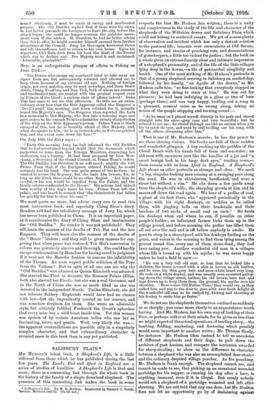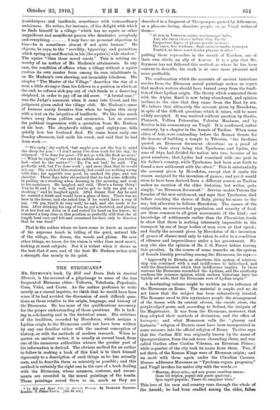SALISBURY PLAIN.* Flunsox's latest book, A Shepherd's Life, is a
little different from those which he has published during the last few years. The Land's End and Afoot in England are a series of studies of localities. A Shepherd's Life is that and more; there is a connecting link through the whole book in the history of the family of a single downland shepherd. The presence of this connecting link makes the book in some • A Shepherd's Life. By W. H. Hudson. Illustrated by Bernard C. Gotch. Nondon: Methuen and Co. ps. sd. net] respects the best Mr. Hudson ,has, written; there is a unity and completeness in the study of the life and character of the shepherds of the Wiltshire downs and Salisbury Plain which could not belong to scattered essays. We get of course plenty of observation and incident which has only a distant relation
to the pastoral life; laments over excavations at Old Sarum, for instance, and stories of poaching cats, and denunciations of gamekeepers, a little too violent for justice ; but the book as a whole gives an extraordinarily close and intimate impression of a shepherd's personality, and of the life of the little villages lying deep in the downs,—a life of patriarchal simplicity and health. One of the most striking of Mr. Hudson's portraits is that of a young shepherd arriving in Salisbury on market-day, followed by his family, "an Apollo of the downs," as Mr.
Hudson calls him, " so fine-looking that everybody stopped in what they were doing to stare at him." He was out for pleasure; he had been indulging in a glass or two of beer (perhaps three) and was very happy, trolling out a song in a pleasant, musical voice as he swung along, taking no notice of the people stopping and turning round :—
"As he came on I placed myself directly in his path and stared straight into his eyes—grey eyes and very beautiful ; but he refused to see me ; he stared through me like an animal when you try to catch its eyes, and went by still trolling out his song, with all the others streaming after him."
That is one of Mr. Hudson's secrets; he has the power to see these shining visions. His books are full of these sudden and wonderful glimpses. A boy rushing up the pebbles of the Chesil Beach with his hands full of foam and sea-water ; an old man with enormous ears like the handles of a jar and "a sweet benign look in his large dark eyes," tending cows,— these remain with us from Afoot in England. A Shepherd's Life shows us other portraits as strange and clear. We meet " a big, singular-looking man coming at a swinging pace along the road. He was in shirtsleeves, barefooted, and wore a straw hat without a rim." He site down a few yards away from the shepherd's wife ; the sheepdog growls at him and he moves off down the road again. We hear of a pedlar of coal, a giant of six foot three, who " appeared periodically in the village with his eight donkeys, or neddies as he called them, with jingling bells on their headstalls and their burdens of two sacks of small coal on each." He feeds his donkeys when and where he can, if possible on other people's fodder; an infuriated farmer locks them up in the village pound, and before morning the pedlar has lifted them all out over the wall and is off before anybody is awake. He goes to sleep in a churchyard with his donkeys feeding on the grass, and wakes in the morning to find them lying among the graves round him, every one of them stone-dead ; they had
been eating yew. Another wonderful old man is a villager whose life is bound up with his scythe ; he was never happy unless he had a field to mow :—
"He was a very tall old man, so lean that he looked like a skeleton, the bones covered with a skin as brown as old leather, and he wore his thin grey hair and snow-white beard very long. He rode on a white donkey, and was usually seen mounted gallop- ing down the village street, hatless, his old brown, bare feet and legs drawn up to keep them from the ground, his scythe over his shoulder. Here comes Old Father Time, they would cry, as they called him, and run to the door to gaze with ever fresh delight at the wonderful old man as he rushed by, kicking and shouting at his donkey to make him go faster."
We do not see the shepherds themselves outlined so suddenly or so sharply ; you come More slowly to an acquaintance worth having. And Mr. Hudson has his own way of looking at their lives, or perhaps rather at their minds, for he gives us less than we might expect of the actual operations of tending sheep,—the lambing, folding, marketing, and doctoring which possibly would seem important to another writer; Mr. Thomas Hardy, for instance. Mr. Hudson likes instead to tell us anecdotes of different shepherds and their dogs; to pull down the archives of past Assizes, and compare the sentences awarded for sheep-stealing ; to show us the difference in character between a shepherd who was also an accomplished deer-stealer and the ordinary despised village poacher. As for poaching, Mr. Hudson is frank enough. The shepherd cannot see, and cannot be made to see, that picking up an occasional wounded partridge for his supper, or running his dog after a hare, is anything immoral, even if it is illegal. But surely nobody would rob a shepherd of a partridge wounded and left after shooting. We are not told that any one does ; but Mr. Hudaon does not let an opportnnity go by Of declaiming against gamekeepers and landlords, sometimes- with extraordinary unfairness. He writes, for instance, of the delight with which he finds himself in a village "which has no squire or -other
magnificent and munificent person who dominates everybody and everything I may have no personal objection to him—he is sometimes almost if not quite human." He objects, he says, to the " servility, hypocrisy, and parasitism which spring up and flourish in his [the squire's] wide shadow." The squire "likes these moral weeds." This is writing un- worthy of an author of Mr. Hudson's attainments. In any case, the condition of affairs when a village without a squire evolves its own master from among its own inhabitants is, on Mr. Hudson's own showing, not invariably felicitous. His chapter " The Master of the Village " describes the rise of a man a little stronger than his fellows to a position in which, at the end, he refuses sick-pay out of club funds to a deserving shepherd, in order to pay off an old score. "A brutal case !" was the Judge's comment when it came into Court, and the judgment given ended the village club. Mr. Hudson's sense of humour surely forsakes him when be begins this story with a text on the iniquities of landlords. We like him much better away from politics and economics. Let us correct the political impression with a quotation from Mr. Hudson at his beat. The shepherd's widow, aged eighty-one, tells quietly how her husband died. He came home early one Sunday afternoon, laid aside his crook, and said that he bad done work :—
. "'It's early,' she replied, 'but maybe you got the boy to mind the sheep for you.'—'I don't mean I've done work for the day,' he returned. 'I've done for gbod—I'll not go with the flock no more.' What be saying?' she cried in sudden alarm. 'lie you feeling bad—what be the matter No, I'm not bad,' he said. I'm perfectly well, but I've done work ' - and more than that he would not say. She watched him anxiously, but could see nothing wrong with him ; his appetite was good, he smoked his pipe, and was cheerful. Three days later she noticed that be had some difficulty in pulling on a stocking when dressing in the morning, and went to his assistance. He laughed and said, 'Here's a funny thing ! You be ill and I be well,- and you've got to help me put on a Stocking !' and he laughed again. After dinner that day he said he wanted a drink and would have a glass of beer. There was no beer in the house, and she asked him if he would have a cup of tea. 'Oh yes that'll do very well,' he said, and she made it for him. After drinking 'his cup of tea he got a footstOol, and placing it at her feet sat down on it and rested his head on her knees ; he remained a long time in this position so perfectly still that she at length bent over and felt and examined his face, only to discover that he was dead."
That is the author whom we have come to know as master of the supreme touch in telling of the quiet, natural life of the village, the downs, the woods and plains. He sees other things, we know, for his vision is wider than most men's, looking at most subjects. But it is widest when it shows us the beat that it sees, and of the best Mr. Hudson writes with a strength due mostly to its quiet.















































 Previous page
Previous page